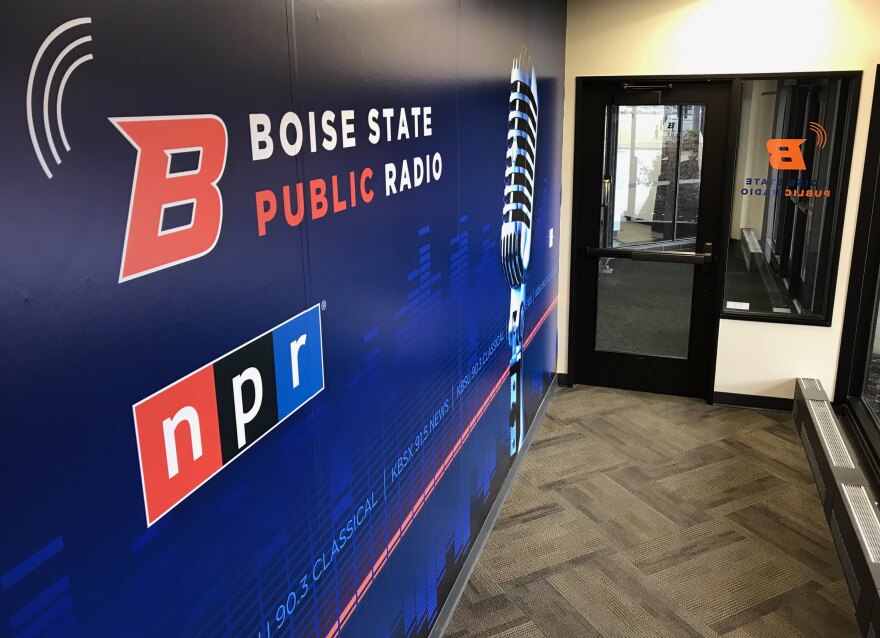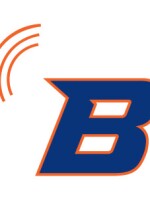2023 was another big year of growth at Boise State Public Radio.
Our coverage areas increased yet again, with new standalone music and news stations in the Wood River Valley. We've also invested to improve signals and equipment across the state.
We've also increased our digital investment, with an increased social media presence (Follow us on Facebook, Instagram & Threads!), our weekly newsletter and digital products like podcasts. You can expect to see another season of Extremely American this summer, along with a historical political podcast that will land this fall.
Tom Michael, general manager of Boise State Public Radio, joined Morning Edition host George Prentice to talk about how things are and the goals we have for 2024.
PRENTICE: It's Morning Edition. Hi. I'm George Prentice. We're going to spend some time here on Boise State Public Radio talking about Boise State Public Radio. I've got the boss in studio this morning. Tom Michael is here, general manager of Boise State Public Radio.
MICHAEL: Good to be with you, George.
PRENTICE: It's a pleasure. Um, we like to call these conversations State of the Station. With our spring drive coming up, we also think that it's a great opportunity to talk a little bit about what's new, what's different. And my first question is, with you being at the top of our org chart, that does indeed make you the face of our organization. When you go out and engage with the public in formal or informal events. And I am curious about those conversations about expectations of us and our organization. And sometimes I'd like to use the word even relationship. Some folks look at their connection to us very personally. What do you hear?
MICHAEL: Well, it's a super privilege for for me and for all of us because we have such interesting audience members and they have such interesting questions for us. I'm often stopped and asked about, you know, certain signal coverage and a certain, you know, intersection or mountainous range. I was, uh, you know, recently asked, I heard I hear your reporters use the word, uh, 24/7. Well, don't you know that it's a leap year and you should really use the term around the clock? And I was I had to think about that mathematically. But anyhow, um, it's fascinating to engage with, with, with our listeners and to hear what they want to hear more of and what they didn't like. So it's super personal.
PRENTICE: Feedback is important, right? Feedback informs us because. Right. It triggers all kinds of conversations. And then we think about, well, let's expand that. How can we be better? Or as opposed to just pushing back, right.
MICHAEL: Oh yeah. We've made direct. I can think of some examples of, you know, changing the way we've talked about weather based on audience feedback. And so I really do hope, you know, as people feel like it's their station and they can reach out to us, you know, all of our financials and our contact information is all freely available on the website. And we are what they call noncommercial educational broadcasting in the in the grand terms of the FCC, the Federal Communications Commission, that that guides the airwaves.
PRENTICE: There are, I think, more than a few people who listen to quite possibly one of our stations. But can you remind our listeners of all of our services?
MICHAEL: Sure. Well, in the Treasure Valley, we have two services standalone separate music station and standalone separate news station. And I'm excited to say that now, in Stanley, for example, we now have two but three stations. So music news and 24/7 or I should say around the clock ... jazz. And we've also George just recently added this in the Wood River Valley. So we we have a standalone news station, KBSS, standalone music, and now 24/7 jazz at 93.5 FM out of Hemingway School in Ketchum.
PRENTICE: How many communities it's it's 20 plus, right? 20 plus communities where we have distinct signals. Right.
MICHAEL: Correct. Our our latest addition was Cambridge and Council. So for the first time we're heard in that western corridor of the state. I think last time I was on the show, we talked about additions in Lewiston and Pocatello. And this summer we're also going to try to bolster our coverage in Challis and Salmon.
PRENTICE: And from my world in the news department that elevates our responsibility for coverage and including those communities, right. Including stories about that. But that's a great opportunity too.
MICHAEL: Well, you've been very good about that. Having lived in other places, you know, coverage of McCall, of Ketchum, of other places. I think that's really important that that we, you and I are sitting right here in Boise, but we are statewide.
PRENTICE: Let's talk a little bit more about investment. Talk to me a little bit about the technical investment, because there usually isn't a week that goes by that I don't say bon voyage to some of our engineering staff who are off to wherever to improve signals, to change equipment, install equipment. It's quite an investment.
MICHAEL: Right. It is a big number too, unlike let's say, radio station back east where there's flat terrain, we have to really try to make the best of our terrestrial signals, our broadcast signals through this mountainous terrain. But not only that, we've also invested a lot in digital. And that includes, you know, like increased social media presence. We hope you find us on Instagram and Facebook. Also subscribe to our newsletter, which is a weekly newsletter which includes a lot of information coming from the station, local and national and regional. And a lot of this investment is in our digital products like podcasts. There's a new podcast just completed called Mustang about the wild horse issue in the West, one of our most downloaded. We're going to have another season of our podcast, Extremely American this summer, also a fun historical political podcast that will probably land this fall. And I can't tell you too much about this, but we're going to have a podcast based in central Idaho based on current day issues, and that'll probably also be this fall.
PRENTICE: Oh, wow. Well, speaking of politics, is it fair to say I think I know the answer to this, that the bar is raised in a presidential election year.
MICHAEL: We have a lot of people listening, close listening, not just nationally. There's always we just wrapped up the legislative session. It was hugely important. People want to know what's happening in their neighborhoods, what's happening to their pocketbooks. Um, so yeah, the stakes are high for sure.
PRENTICE: Well, we do have a spring drive in front of us over the next several days, and it is us, hat in hand, asking for help. Remind us of how important listener support is.
MICHAEL: Listener support is essential, especially when we think about our spring drive, which is one of our biggest of the year. We really rely on the funding that comes in, and you can go to our website right now and scroll down and look at the about page, and there's a pie chart there, and it will show you that 74% of our funding comes from local sources, whether it's local businesses or individual members. And that's ... Some people are surprised to hear that. You know, they think we get funding in other ways, but we really do rely on the 11,000 plus members that we have across the state. And it's really a moment for them to say, I care about this service. I want to see it continue and expand, and I'm going to put dollars behind that thought.
PRENTICE: You've been through a few of these. What do you think works? What do you think works in a drive? How do we reach? How do we connect?
MICHAEL: I was at the doctors the other day and they asked me, what kind of learner are you? Do you like written? Do you like it visually presented? Do you like me to tell you? And it was really interesting to hear that. And I think our audiences like that. Some people like to be told, some people want a story, some people want to look under the hood and know what the what the costs are. So everyone's different. But I think, really, George, when I hear you on the air and you describe, you know, when we hear from listeners and they, they describe what it means to them, what the, you know, you reliably in the mornings, sharing interviews means to them, you know, that really touches people.
PRENTICE: And it is I know the cliche is that it's a public trust, but it's also a bit of a thrill. And in a landscape where journalism, these are not, you know, glory days in the world of journalism, there are fewer journalists employed today than there were a year ago. We're pretty darn lucky, right? We have a pretty good size investment into journalism at this organization.
MICHAEL: We do, and it's 45 years plus. We really do have support and respect.
PRENTICE: And I always like to think, what would it be like if our listeners could be a fly on the wall in our editorial meetings? And I always like to think that they would be very happy. They'd be very proud. It's it's a it's a good investment. When we look under the hood of stories, it's, it's an amazing group of people that we work with. And by the way, what do you think the secret sauce is to finding good people and keeping good people? Because that's a challenge in any workforce.
MICHAEL: So we just had a recounting of the years of service of our staff, and it was pretty stunning, the longevity of staff, you know, lack of churn that's really important in any business today. Uh, it is a very talented staff. They're very mission driven and they tend to stay here. And it's there's great camaraderie. But also we get to serve this great audience and work on this product. And I might be correct in saying that's what gets you up in the morning.
PRENTICE: You know, that's what gets me. I think it's it's the best gig in our industry. It's not easy to get up in the middle of the night. That said, lucky me.
MICHAEL: I said, what gets you up in the morning? Of course you're far before that.
PRENTICE: Yes. Well, great. Good luck over the next several days to all of us. But to you in particular, I'm actually looking forward to the drive.
MICHAEL: I am too. It's a real great time to connect with audiences, and we'd love to hear from you, and we'd love to get your financial support.
PRENTICE: Thanks, Tom.
MICHAEL: Thank you.



